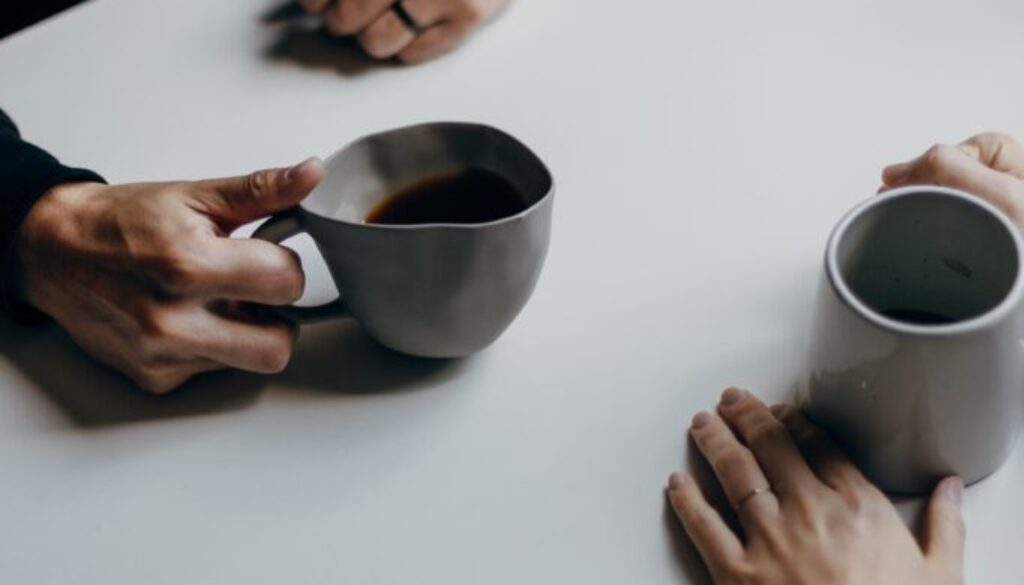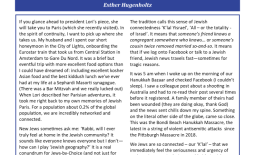Everybody’s Judaism
As a rabbi, I frequently regret my life choices. I say this in jest, of course, but sometimes I try discern my own insanity on preaching all throughout Elul when I should be buckling down on writing my High Holiday sermons.
Still, I remain committed to this project because this sermon series – of which today’s sermon is the last one – helps us to build to the High Holidays so we can do the inner work required.
For the last few weeks, I’ve spoken about how to ready our hearts for the Yamim Noraim; are we willing to be vulnerable? To crack ourselves open a little? Are we prepared to challenge ourselves and grow? To be discomfited for the sake of insight; to be pushed for the sake of change? This is the charge this sacred season gives us.
I have also spoken about ‘impostor syndrome’ versus ‘beginner’s mind.’ So many of us struggle to access Judaism, and even upon accessing it, can feel daunted by the task of making it our own. Sometimes, our perceived inadequacies stop us at the door. The High Holidays can be a pressure cooker where our deep, conflicted, ambivalent feelings about Judaism come to the fore. Is this my bubbe’s or zayde’s Judaism or is it mine? Is it the Judaism of how things were in the past or what may yet be to come? Is this what it should be or can I dream of what it could be? We might feel torn between our childhood memories, the expectations of generations and the critical demands of the modern world. There are few instances when the contrast can seem so stark: between our personal accomplishments in the world of our careers and families and the weighty words of the Machzor. We sit with the book in our lap and thoughts may tumble over us. What does this mean? What’s the context? This is important but I can’t believe it. I struggle with this image of God. I resist the idea of judgment, of who-lives-and-who-dies. I am puzzled, bored, bemused.
Of course, this is not a uniquely modern problem. I promise you: Jews have been bored in services all throughout Jewish history! (Maybe if you’re a Kohen in Temple times, you had some exposure to engaging pyrotechnics and Divine special effects). The fact that we have always had internal divisions: the twelve tribes, the Northern versus the Southern Kingdom, Sadducees versus Pharisees, Mitnagdim versus Chasidim… speaks to the very tensions many of us struggle with. Our story has never been a united one; but it is a real one—that speaks to the lived experience of all of us.
There is not one piece of advice that will help all people equally when it comes to navigating the High Holidays. We all have to calibrate our own approach, determine our own comfort zone and set our own boundaries. But an overarching principle for approaching this sacred season can be found in this week’s Parashah: ‘Atem nitzavim hayom kulchem lifnei Adonai Eloheichem’ – ‘You are standing today, all of you, before the Eternal your God.’ It is a signature verse that has received more commentary than I can shake a stick at. It is treasured and well-known, the Torah’s banner of inclusivity and even painted here on the walls of our sanctuary. It seems almost trite to preach on it because the message seems obvious: everyone belongs. This is all our Judaism. Everyone’s Judaism.
Still, it bears repeating. As a congregational rabbi, I bear witness, time and again, to the delegitimizing and critical voices that seek to undermine our Judaism; our sense of belonging. Sometimes, others do this to us. Sometimes, we do this to ourselves.
‘I am a bad Jew’ is an oft-repeated refrain, usually followed by a quip about synagogue non-attendance or certain culinary preferences.
‘I don’t do my Judaism like my parents did’ is another common trope, recounted with downcast eyes and some degree of embarrassment. ‘I don’t know much. I can’t read Hebrew. I don’t believe in God. I am not religious. I only have a Jewish father. I converted. I converted and someone told me I’m not a real Jew. I grew up Reform. I was raised secular. One of my parents is not Jewish. We had a Christmas tree at home. I don’t know how I feel about Israel. I don’t keep kosher. I don’t keep Shabbat. My Orthodox relatives don’t accept me. I am intermarried. I dropped out of Hebrew School. I dropped out of Sunday School. I don’t look Jewish. I am queer. I am disabled. I am a Jew of Color. I am poor. I don’t know anyone in the community. I don’t feel like I belong.’
The litany goes on, almost like an inverse liturgy, like a series of ‘al chet she’chatanu lefanecha’s’, ‘for the sins I’ve committed against You.’ I have heard it all; the grievances we weaponize against others or worse yet, we weaponize against ourselves.
But the Parashah anticipates this. From the loftiest to the lowest: we are here. Even the drawers of water and the hewers of wood. Is it a coincidence that we read this portion right before the time when our community gathers en masse? Where we approach this space with some degree of trepidation?
I often like to joke that the Jewish People have the worst PR campaign in human history. That may or may not be true, but perhaps, we should be less invested in the opinions of others and more concerned with the wellbeing of ourselves. What is heart-breaking is when we police our own boundaries and shut our own gates. When we internalize that somehow, we fall short and are not enough.
I know that feeling all too well. For many years, I thought I was not enough. Without any Jewish ancestry, too blonde, too female and too young. (The latter issue time will resolve, the rest, I am gloriously stuck with). I felt trepidation about becoming a rabbi: a leader and teacher of the Jewish People. Every rabbi feels that sometimes and I am not immune. And yet, I know that my soul was standing at Sinai too—at the events recounted in this week’s portion. We all have exactly the right to be exactly who we are called to be and to be Jewish on our own terms.
To God and to Moses, it made no difference. All of us. And in a week from today, all of us will be gathered in this sanctuary—a great deal fuller than it is right now. And some of us might be uncertain, and nervous, perhaps. But I hope that the overarching emotion is anticipation, a softness of the heart and a deepness to our joy. This place is for all of us. This is everyone’s Judaism. You are so welcome here—we are delighted to have you.




